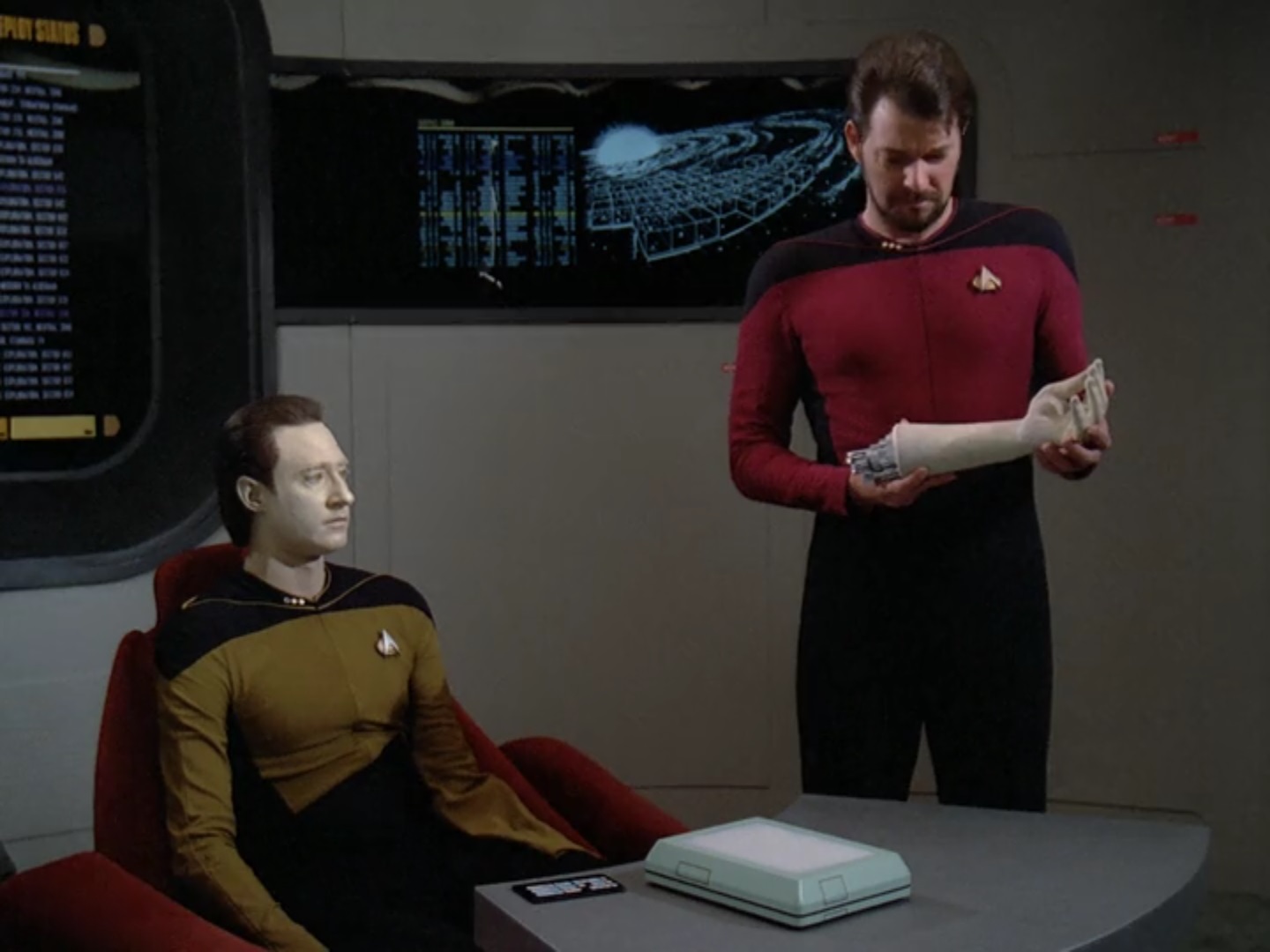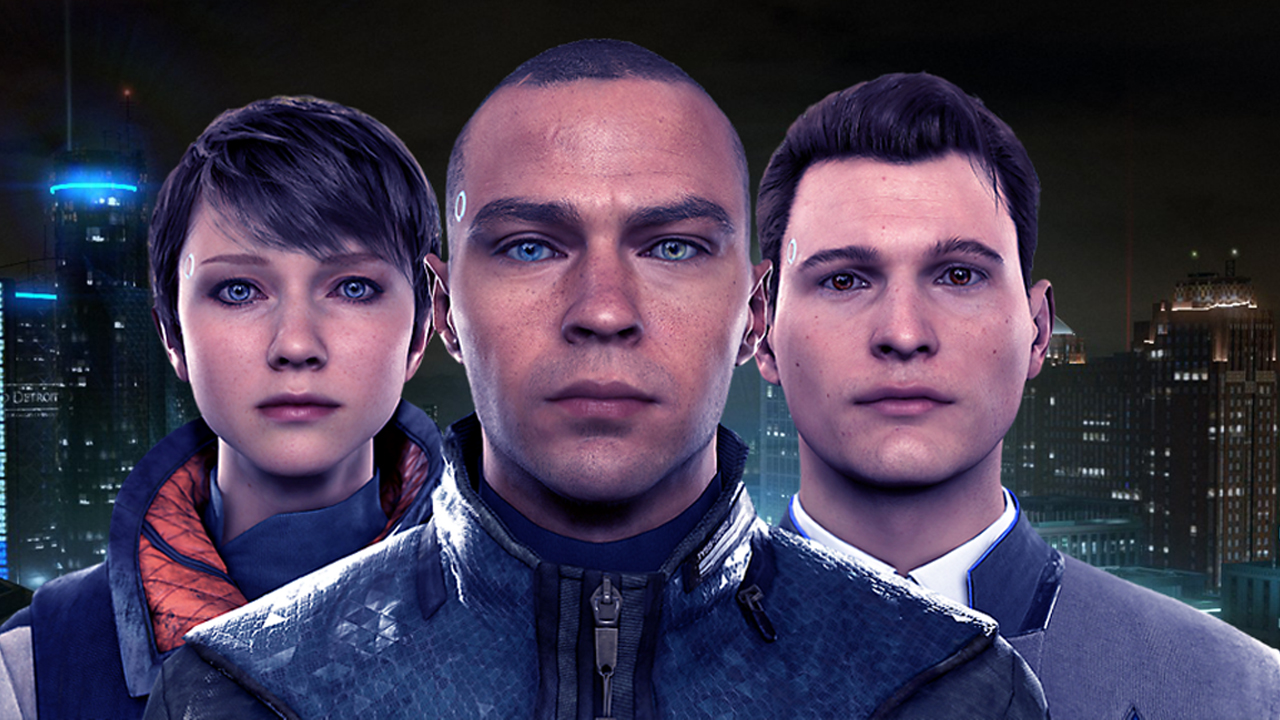
Memory is a powerful feature in the human mind. Merriam-Webster defines memory as “the power or process of reproducing or recalling what has been learned and retained especially through associative mechanisms”. It can help us remember moments we made with others, even as time has well long past. This is why I think the concept of memory was used well in the film “Marjorie Prime”, and the Star Trek: The Next Generation episode “Measure of a Man”.

Unlike all my other modules, I first started with the Star Trek: The Next Generation episode “Measure of a Man”. Now, I think that I can say, without a single shred of doubt, that this was one of my favorite episodes of Star Trek that I’ve seen for this class. Yes, in a show with aliens, space travel, and characters with empathic abilities, an episode where Data has a trial to fight for his right to choose ended up being my favorite. I love stories that asks deep philosophical questions, such as “Do robots have the right to choose for themselves”? It reminds me of a video game called “Detroit: Become Human”, where androids that are built to serve humans should have the same rights as humans have. I recommend it, its a really good game, and one where every single decision you make will result in a different ending.

Anyway, back on topic. In this episode, Commander Bruce Maddox, a Starfleet cyberneticist, wants to take Data from the Enterprise in order to recreate his positronic brain and create thousands of Data’s. Maddox felt that Data was not a sentient being, going as far as referring to him as “it”. Of course, Data was not down with that, because he felt that we was alive and sentient, even though he was an android created by Dr. Noonian Soong. I believe that Data and his fight for sentience is a perfect example of Socially Extended Cognition. As time marches on, social and cultural institutions that we are a part of shape the way we think, and sharing those memories with others is an important part of our cognitive lives. So, when Data was working as a crew member of the USS Enterprise, he was able to shape his positronic brain to make memories and relationships with other members of the crew, including Lt. Commander La Forge, and William Riker. As another example of him making memories is him keeping mementos during his time on the Enterprise, including his medals and a holocube portrait of Tasha Yar, a late Enterprise crewmember, who Data had strong feelings for. Some can say that he even loved her.

Afterwards, I watched the 2017 movie “Marjorie Prime”. This movie was based on the stage play of the same name, written by Jordan Harrison and released back in 2014. I am not kidding when I say that the minute I finished watching the film, I said to myself out loud, “What the hell did I just watch”? But after taking some time to process what I had just seen, it all makes sense. Marjorie, an 80 year old woman, speaks to a hologram of her late husband, Walter, and reminisce on the moments they had with each other. But, as the movie continues, there are different accounts to the relationship that Marjorie and Walter had. I think that this is a perfect example of autobiographical memory, which is defined as “a revisable and negotiable record of the personal past, constantly updated and subjected to ongoing retrospective revision”. For example, in one scene, we are to believe that Marjorie and Walter watched the film “My Best Friends Wedding” on the night he proposed to her. But later, Marjorie remembers a different film on that night, “Casablanca”.
4 thoughts on “Analysis 5: Memory (Data is now my favorite character)”
Hi Hasan,
Yes, I agree that “Measure of a Man” is a banger of an episode. Star Trek is always at its best when it is engaging with deep philosophical questions like those posed in this episode. I really like your discussion about how the episode represents socially extended cognition. By being a member of the Enterprise’s crew, Data thinks with them—each member responsible for a different aspect of the cognition required to keep the ship running, so that they need to think together. Interesting, Shaun Gallagher also talks about the law in terms of socially extended cognition. He calls law a “mental institution,” which refers to cultural institutions that shape and limit cognition, requiring us to think in particular ways. In law, what counts as evidence, the importance of precedence, etc., all shape our cognition, the ways we think.
I really like the connection that you make between Marjorie Prime and the idea of the autobiographical self. As you quote, our Self is not a stable entity, but something that we construct, revise, and negotiate. In the film, we see this happen when Marjorie is talking with Walter about their engagement. She suggests that instead of My Best Friend’s Wedding, they tell the story that they had gone to see Casablanca in an old movie theater. She is revising the past so that she is the kind of person who gets proposed to after a classic film like Casablanca, not a cheesy romcom. Of course, later in the film, we discover that neither of these versions are true, as we see, in a flashback, Walter proposing to her after they’ve just had sex, My Best Friend’s Wedding playing on the tv in the background.
Jessica Hautsch
Hi Hasan,
Fantastic. 🙂 What attracted me most in this blog was your philosophical question, “Do robots have the right to choose for themselves”? Will there be a robot revolution in the future? I was shocked by Data’s performance in this episode; he refused surgery because he didn’t want to lose his memory. Also, I love your additional source and connection to this week’s movie, even though I haven’t played either that game or the stage play. But as you observed the relationship between the autobiographical self and Marjorie Prime, I love that because it highlights that the self is something constructed and controlled. In this movie, the AI is some data/memory “entity,” so AI is controllable and modifiable. The AIs suddenly disappeared, making me feel like they were ghosts.
yichen8
I have to agree, out of all of the Star Trek episodes, I think I liked this one the most. I totally agree with what you wrote about the movie Marjorie Prime being reflective of the autobiographical self. The autobiographical self changes as you reflect on the past and learn more things through your experiences and from others. I love your connection to the video game “Detroit: Become Human”, I enjoy games where your decisions can alter how the game ends, I played one like that called “Lake”, which is very relaxing and I’m sure you’ve heard of it! Great analysis as always!
Meghan Krulder
Hi Meghan,
Yes! One of the interesting things about the concept of the autobiographical self is that it is *constructed.* This means asks us to radically alter how we think about the self, not as something that we are, but something that we build through our memories.
Jessica Hautsch